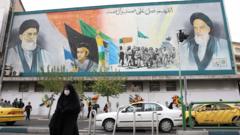With military retaliation potentially heightening conflict, Iran's leadership grapples with the dilemma of responding to Israeli attacks versus managing perceptions of weakness. The situation escalates further amid U.S. support for Israel, showcasing a shift in regional dynamics.
Iran's Dilemma: Weighing Military Response Against Perceived Weakness

Iran's Dilemma: Weighing Military Response Against Perceived Weakness
Amid escalating tensions following Israeli airstrikes, Iran faces crucial choices that could reshape the stability of the Middle East.
Empty line 4
As tensions in the Middle East continue to escalate, Iran finds itself at a crossroads, evaluating its next steps following Israel's recent airstrikes. The Iranian leadership, particularly Supreme Leader Ayatollah Ali Khamenei and his advisors, must navigate a complex landscape filled with risks of escalation and the danger of appearing weak before their adversaries.
At one extreme, Iran could retaliate with ballistic missile strikes, as its official media has suggested in recent days. Such a move would likely provoke further retaliatory strikes from Israel, which has firmly positioned itself for defense should Iran choose to strike back. Conversely, the Iranian leadership may decide to exercise restraint in hopes of de-escalating the conflict, saving face while avoiding direct military confrontation that could lead to greater regional instability.
Statements from Iranian officials illustrate a mix of defiance and caution. Foreign Minister Abbas Araghchi recently asserted that any attack on Iran would breach a "red line," while Iranian spokespersons maintain their commitment to self-defense in accordance with international law. However, the high stakes of the situation may prompt Iran to reconsider its threats in light of the prevailing tensions.
The conflict stems from Israel's perception of Iran as a primary backer of Hamas, which carried out deadly attacks on Israeli territory. Iran’s strategy has predominantly involved supporting proxy groups like Hezbollah and the Houthis to apply pressure on Israel without triggering a large-scale war. This strategy faced significant challenges when Israel initiated a series of targeted strikes, aiming to cripple Iran's influence and retaliation capabilities.
The broader geopolitical context is increasingly influenced by U.S. support for Israel, with President Joe Biden's administration providing military backing and reinforcing Israel's air defenses amid heightened conflict. This backing lends Israel confidence to escalate its military operations against Iran and its allies.
The relentless violence witnessed over the past months has raised the prospect of a wider conflict, leading both Iran and Israel to reconsider their strategies. Israeli airstrikes have caused substantial casualties in Lebanon and shifted the balance of power, uprooting thousands of civilians amid an already fragile humanitarian situation.
As both nations posture for strength, it remains uncertain whether they will risk a spiral into deeper conflict or whether diplomatic avenues, potentially reopening nuclear negotiations, can be explored. The looming U.S. elections may further complicate the dynamics, with varying approaches from presidential candidates influencing decisions on potential military responses.
Ultimately, Iran's leadership faces the formidable task of asserting its regional influence without triggering an unwinnable confrontation, leaving the international community with a keen eye on the imminent decisions that will shape the region's future.
As tensions in the Middle East continue to escalate, Iran finds itself at a crossroads, evaluating its next steps following Israel's recent airstrikes. The Iranian leadership, particularly Supreme Leader Ayatollah Ali Khamenei and his advisors, must navigate a complex landscape filled with risks of escalation and the danger of appearing weak before their adversaries.
At one extreme, Iran could retaliate with ballistic missile strikes, as its official media has suggested in recent days. Such a move would likely provoke further retaliatory strikes from Israel, which has firmly positioned itself for defense should Iran choose to strike back. Conversely, the Iranian leadership may decide to exercise restraint in hopes of de-escalating the conflict, saving face while avoiding direct military confrontation that could lead to greater regional instability.
Statements from Iranian officials illustrate a mix of defiance and caution. Foreign Minister Abbas Araghchi recently asserted that any attack on Iran would breach a "red line," while Iranian spokespersons maintain their commitment to self-defense in accordance with international law. However, the high stakes of the situation may prompt Iran to reconsider its threats in light of the prevailing tensions.
The conflict stems from Israel's perception of Iran as a primary backer of Hamas, which carried out deadly attacks on Israeli territory. Iran’s strategy has predominantly involved supporting proxy groups like Hezbollah and the Houthis to apply pressure on Israel without triggering a large-scale war. This strategy faced significant challenges when Israel initiated a series of targeted strikes, aiming to cripple Iran's influence and retaliation capabilities.
The broader geopolitical context is increasingly influenced by U.S. support for Israel, with President Joe Biden's administration providing military backing and reinforcing Israel's air defenses amid heightened conflict. This backing lends Israel confidence to escalate its military operations against Iran and its allies.
The relentless violence witnessed over the past months has raised the prospect of a wider conflict, leading both Iran and Israel to reconsider their strategies. Israeli airstrikes have caused substantial casualties in Lebanon and shifted the balance of power, uprooting thousands of civilians amid an already fragile humanitarian situation.
As both nations posture for strength, it remains uncertain whether they will risk a spiral into deeper conflict or whether diplomatic avenues, potentially reopening nuclear negotiations, can be explored. The looming U.S. elections may further complicate the dynamics, with varying approaches from presidential candidates influencing decisions on potential military responses.
Ultimately, Iran's leadership faces the formidable task of asserting its regional influence without triggering an unwinnable confrontation, leaving the international community with a keen eye on the imminent decisions that will shape the region's future.























